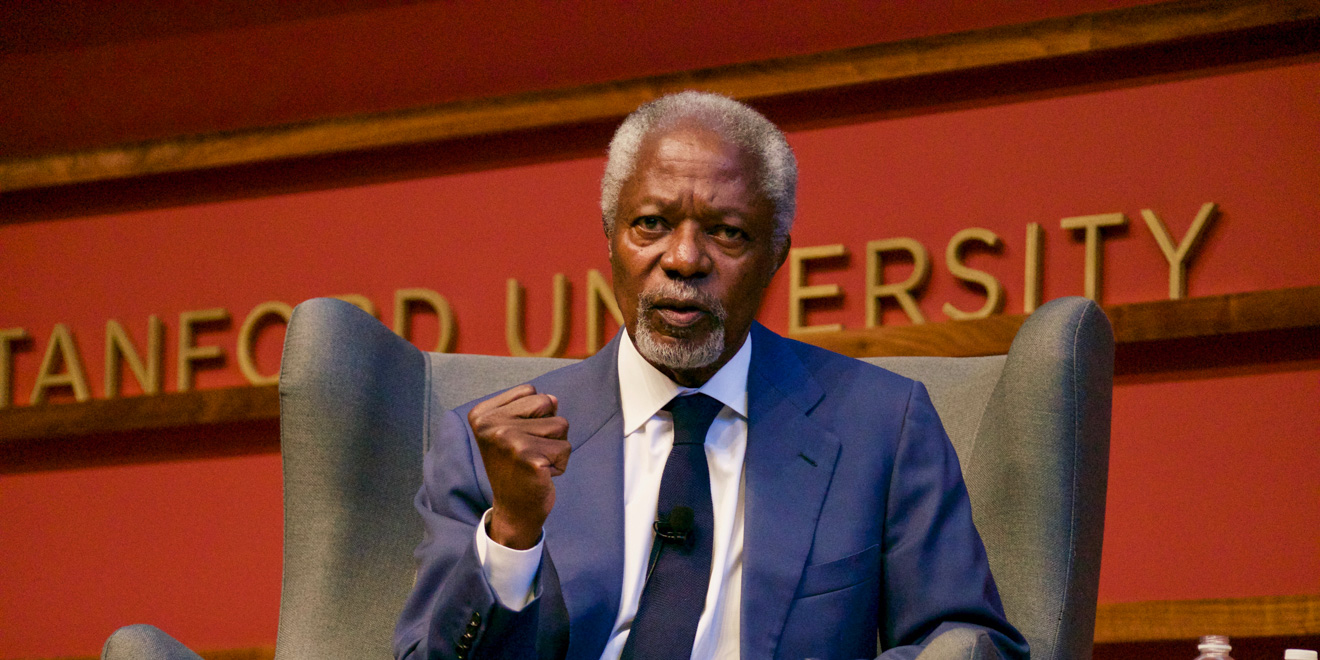On Tuesday, former United Nations (UN) Secretary General Kofi Annan discussed topics ranging from the rise of illiberal democracies to the Syrian Civil War and the Rohingya Refugee Crisis in a panel discussion with Francis Fukuyama, senior fellow at the Freeman Spogli Institute for International Studies (FSI).
The talk was organized by FSI’s Center on Democracy, Development, and the Rule of Law (CDDRL) and co-sponsored by the Handa Center for Human Rights and International Justice. Undergraduates, alumni and community members alike were in attendance.
According to the directors of CDDRL, a primary motivation for hosting the event was to expand the public discourse on the center’s research into elections, social media and food security.
“The aim of this talk was to discuss dysfunction in democracy,” said Sarina Beges, CDDRL’s associate director. “This is one of the main research areas at CDDRL right now.”
CDDRL Deputy Director Stephen Stedman ’79 Ph.D. ’88 added that another purpose of the event was to connect Annan with students and faculty with similar research interests.
“We wanted to introduce [Annan] to faculty working on food security and democracy,” Stedman said. “We wanted to give him a chance to run some of his ideas by faculty and also meet students.”
Annan and Fukuyama began their conversation by discussing the rise of illiberal and anti-democratic forces in the world today. According Annan, this trend is caused by the rise of xenophobia, racism and populism.
“[Populists] make promises that they cannot fulfill,” Annan said. “Apart from this, there are changes taking place. I don’t think governments are adapting fast enough to deal with these changes. [Economically,] people feel they have been left behind, and no one is offering an alternative or an ambition for the future.”
However, he said that the trend is nothing new, referring to the Industrial Revolution and the end of the Second World War as historical precedents. He also gave the examples of Canada and France as countries that countered populist ideals.
“I hope mainstream politicians will have the courage to take on these challenges rather than following the extreme politicians,” he said. “If you talk to people honestly, they will listen. People want good leadership.”
Shifting the conversation to international politics, Fukuyama asked Annan about the changing role of the U.S. within the UN.
Annan emphasized that the UN should reach out to businesses and individuals, as he tried, in order to strengthen its image in the world.
“I realized that to help the UN, we needed to reach out,” Annan said. “We couldn’t make it a club of ambassadors. So I decided to reach out to the private sector … so that was also part of the approach in fighting back the isolationism that appeared in certain governments.”
According to Annan, electoral systems should be stronger across the globe. Elections, though they should facilitate peaceful leadership transitions, often lead to conflict, he said. He added that members of the Kofi Annan Foundation have been working in Cameroon, Mexico and other countries to help promote stable and fair elections. However, he noted that compared to when he started out in 2012, issues that undermined the legitimacy of elections have rapidly changed.
The event also focused on the extent to which big technology firms should be regulated. Fukuyama asked Annan if he trusted big firms like Facebook to self-regulate.
“I think some form of national regulation is necessary, but I would encourage the companies to cooperate and work with governments to come up with regulation that will allow them to perform but also protect society and the rights of the individual,” Annan responded. “You cannot have big data and you cannot have all this information on people. What happens to the privacy of individuals?”
Annan and Fukuyama also discussed responses to the Rohingya refugee crisis and the Syrian Civil War, as well as approaches to handling migration.
One question raised by the audience was whether Annan had any advice for students with interests in international relations.
“When you see something wrong, don’t be a bystander,” Annan responded. “You are never too young to lead. Don’t let my generation tell you, ‘Shut up and wait your turn.’ If there’s something you feel that you can do something about, do it. Work across racial, religious and other lines. Don’t accept divisions you see in society.”
Annan went on to describe traits he deemed necessary for effective leadership.
“Above all, if you are going to become a leader, you have to listen, you have to observe and you also have to follow. A good leader has to be a good follower,” he said.
Attendees commented on the discussion’s relevance to Silicon Valley’s ethos of building technology that productively serves society.
“A perspective on a key takeaway [from this talk] for Silicon Valley and Stanford is how to be more responsible of how technology should be developed,” said Radhika Shah M.S. ’91, advisor to the UN Sustainable Development Goals Philanthropy Forum.
Contact Vibhav Mariwala at vibhavm ‘at’ stanford.edu.
